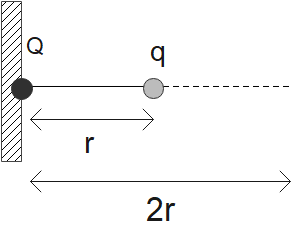Question
Question: A charged particle of charge Q is held fixed and another charged particle of mass m and charge q (of...
A charged particle of charge Q is held fixed and another charged particle of mass m and charge q (of the same sign) is released from a distance r. The impulse of the force exerted by the external agent on the fixed charge by the time distance between Q and q becomes 2r is:
a.) 4πε0mrQq
b.) 4πε0rQqm
c.) πε0mrQq
d.) 2πε0mrQq
Solution
In the above question we need to find out the velocity of the particle. When a particle moves, it possesses kinetic energy. When the charge particle moves between the two points under the influence of a potential either it gains or loses potential energy. In the above case it will lose its potential energy which will be seen in the form of kinetic energy.
Complete answer:
To solve this question, first we will make a diagram to understand where each charge is placed an at what distance, making diagram always makes the problem easy to solve

According to the law of conservation of energy, the total energy always remains conserved and Energy can neither be created nor be destroyed. Using this simple law we know that the sum of kinetic energy and potential energy always remains conserved.
Net Impulse (I) = 0∫tF.dt=mΔvq
Initial Potential energy for charge “q” is Ui=4πε01rQq
Final potential energy Uf=4πε012rQq
As the charge Particle “q” is only under the effect of electrostatic forces, this means that the mechanical energy is conserved.
Final Kinetic Energy Kf=Ui−Uf=4πε012rQq
kinetic energy is defined as Kf=21mvq2
Therefore, vq=m2Kf
Impulse I=mvq=2mKf=4πε0rQqm
Hence, we can conclude that option (b) 4πε0rQqm is the correct answer.
Note:
It is to be noted that all the physical quantities have to be expressed in terms of SI units. The basic idea of solving the above question was conservation of energy. Though the above scenario might not be according to reality, if we know how the energy gets transformed into other forms, we will be in position to determine the answer more precisely.
